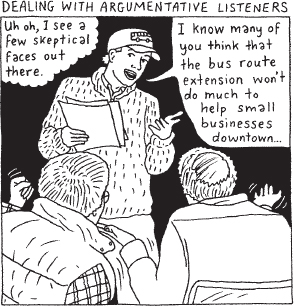Anticipate Ineffective Listening before Your Speech
Printed Page 109
Advance preparation is key to ensuring that your audience will truly listen to your message. Be sure to consider your audience’s needs as well as outside factors, and plan your speech accordingly.
Consider Your Listeners’ Attention and Energy Levels. People listening to a speech at 8:30 on a Monday morning will likely have a limited attention span. Many may be tired from the weekend and may not have adjusted to the new week. Therefore, avoid delivering a long speech with no audience interaction during times like this. Instead, give a concise presentation and allot time for active listener participation.
Assess Your Audience’s Knowledge and Abilities. If your audience members know little about the subject of your speech, they may become confused when faced with unknown jargon or too many technical details. To avoid that, explain concepts and define key terms. Also, consider any barriers to understanding, such as whether everyone in your audience has a similar capacity with the English language or whether anyone has problems with hearing. Then adjust your word choice or volume level as needed.
Front- and Back-Load Your Main Message. Listeners tend to pay the most attention just after the beginning of a speech and just before the end. For this reason, plan your speech ahead of time in the following way: front-load your main message—that is, present it early in your speech—then use your conclusion to give listeners another opportunity to process and retain your message.
Use Presentation Aids Strategically. Presentation aids can help you capture audience attention and thereby encourage listening. Therefore, plan to space these aids throughout your speech to maintain interest. Also, don’t incorporate a given presentation aid until you want your audience to see or hear it. When you are finished with it, put it away, outside your listeners’ view or hearing range.

Encourage Active Listening during Your Speech. When you are ready to give your speech, be sure to pay attention to what you see among your audience. Practice audience surveillance, pay particular attention to if and how they are listening to you, and be prepared to make adjustments as you go.

Tailor Your Delivery. As you deliver your speech, pay attention to factors you can control that affect your audience’s ability to listen: voice, volume, fluency, projection, rate, and timing. Speaking too quietly can inhibit listening, as can poor fluency, fast delivery, or excessive pausing. Be sure to maintain eye contact with your audience, and avoid making obtrusive gestures (such as pointing at the audience) or turning your back on the group while adjusting a visual aid.
Watch Out for Argumentative Listeners. As discussed earlier in this chapter, argumentative listeners will attend to only as much of your presentation as they need to build up their own case against it. To improve your chances of keeping their attention, acknowledge their viewpoints early in your speech (e.g., “I know that some of you may not think that having tattoos will affect your careers”) and repeatedly press your main message throughout the presentation.
Watch Out for Defeated Listeners. Defeated listening occurs when listeners feel overwhelmed by your message and find it too difficult to follow. Speakers who deliver technical or detailed presentations may find this a particular challenge. Defeated listeners may avoid eye contact or work on something else while you speak.

You can prevent defeated listening by pausing occasionally during your speech to ask the audience questions—such as whether they understand your last point or if they can think of an example or application of what you have just said. By doing so, you can test their comprehension while assessing whether they are really following along. If you cannot engage them here, back up and repeat your message, using simpler language and different examples.
Watch Out for Superficial Listeners Audience members who pretend to pay attention but who are in fact distracted by internal or external noise (such as wandering thoughts, cell phones, or conversation) are engaged in superficial listening. To prevent it, request that people turn off cell phones and resist checking for messages on handheld devices or laptops during the presentation. Also, be sure to use direct eye contact with people who you sense are listening superficially (they will pay more attention if they see that you are watching them), and go ahead and ask them questions—or invite them to ask you some.